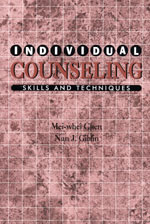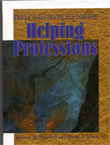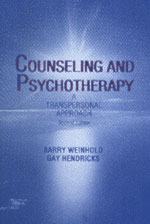 |
| >HELPING SKILLS AND STRATEGIES |
| Thomas M. Skovholt and David Rivers
Skovholt and Rivers capture the essence of basic counseling skills in this new revolutionary text. They present an approach to skill development that revolves around the four core areas: exploring client concerns, promoting client understanding, charting a new course, and working for positive change.
Helping Skills and Strategies is a thoroughly practical guide. A consistent structure within chapters makes it easier to assimilate complex information. Hypothetical therapy dialogues—key strengths of the text—demonstrate how to use the skills described in the chapters in clinical situations. The test leads students step-by-step in developing helping skills.
The broad range of material covered, the authors' skills in linking chapters conceptually, the skill-building exercises, plus the clear, simple writing style make this book an exceptional foundation for introductory classes on professional helping. It is an excellent all-in-one text for the beginning skills course in all the human service, education, and health professions—counseling, social work, psychology, family therapy, nursing, and pastoral counseling.
Special Features
- Hypothetical dialogues at the end of each chapter showing skills for effective helping
- Exercises at the end of each chapter that let readers engage in role playing to practice skills discussed in the chapter
- Cultural concerns are woven throughout the text
- Includes step-by-step ideas for skill development
Contents
Part 1: Introduction
1. Introduction to Professional Helping
2. Diversity, Culture, and Helping
Part 2: The Helping Process
3. Beginning, Maintaining, and Ending the Helping Process
Part 3: The Helping Relationship
4. The Context for Helping: The Special Relationship Between Helper and Client
Part 4: Exploring Client Concerns
5. Exploring the Unique World of the Client
6. Nonverbal Exploration Skills
7. Verbal Exploration Skills
Part 5: Promoting Client Understanding
8. Striving Toward Honest Understanding
9. Skills for Promoting Client Understanding
Part 6: Charting a New Course
10. Setting Goals
11. Identifying Actions
Part 7: Working for Positive Change
12. Taking Action
13. Evaluation
Part 8: Helping Issues, Aspects, and Topics
14. Ethical and Legal Issues in Helping
15. Professional Challenges, Motives and Rewards
372 pages
2007/paperback/ISBN 978-0-89108-327-6
$56.00
|
|
|
|
|
 |
| >INDIVIDUAL COUNSELING: SKILLS AND TECHNIQUES |
Mei-Whei Chen and Nan J. Giblin
Northeastern Illinois University
This insightful book is packed with examples of core skills and techniques. The text shows how to do intakes, how to pace clients, and how to use probing to gather client information. Most importantly, the book illustrates how to use specific interventions, such as directives, reflective questions, and narrative techniques.
You’ll find dozens of examples and hands-on practice ideas. Individual Counseling shows how to make connections between the counseling skills students learn and the actual implementation of those skills. It includes helpful hints for dealing with client rambling, ways to handle confrontation, how to write case notes, and much more.
Special Features
- Includes helpful hints for beginning counselors
- Shows journal writing samples and describes why they are important
- Details strategies for case conceptualization
- Outlines helpful hints and intervention techniques
Contents
- Challenges of Learning Counseling Skills
- Intake and Professional Disclosure
- Basic Empathy: Reflective Listening
- Basic Inquiry Skills
- Helpful Hints for Beginning Counselors
- Advanced Skills: Influencing Skills
- Intervention Techniques
- Termination Skills
- Case Conceptualization: The Covert Skills
224 pages
2002
paperback/ISBN 978-0-89108-288-0
$38.00
|
 |
|
 |
| >Foundations in Psychotherapy |
Karin Jordan
This introductory text provides clear guidance for basic counseling skills for beginning practitioners. Clinical skills, supervision, the process from the first session through termination, and ethics are all highlighted. Case examples in each chapter demonstrate the clinical challenges often faced and the implementation of skills presented. Exercises encourage readers to engage and self-explore as they discover their personal counseling styles.
Online counseling, trauma psychotherapy, and play therapy are three unique topics explored in this book, helping practitioners keep up with the constantly evolving field. Foundations in Psychotherapy is the ideal text for courses focusing on helping skills and cutting-edge techniques.
pages 610
paperback / ISBN 978-0-89108-323-8
$34.95
|

|
|
|
 |
| >SKILLS AND STRATEGIES FOR THE HELPING PROFESSIONS |
Thomas M. Skovholt and David Rivers
University of Minnesota
The primary focus of this book is on skills, strategies, and procedures used in the helping professions. It is an easy-to-read and highly informative text that explains the nuts and bolts of what helping is all about. The model for the book involves the four core areas of exploring client concerns, promoting client understanding, chartering a new course, and working for positive change. Activities within the four core areas are explored through the use of exercises and dialogues between helper and client.
A consistent structure within each chapter makes it easy to assimilate the information provided. The hypothetical dialogues at the end of each chapter demonstrate how helpers use the skills described in the chapters in real-life helping situations.
The book is appropriate for adoption for the beginning skills course in all the human service, education, and health professions such as counseling, social work, psychology, family therapy, nursing, and pastoral counseling. The text contains hundreds of ideas to help people become skilled in the art of helping others.
SPECIAL FEATURES
- Hypothetical dialogues at the end of each chapter showing skills for effective helping
- Exercises at the end of each chapter that let readers engage in role playing to practice skills discussed in the chapter
- Cultural concerns are woven throughout the text
- Includes step-by-step ideas for skill development
448 pages
0305/paperback/ISBN 978-0-89108-302-3
$68.00
|
 |
|
 |
>COUNSELING AND PSYCHOTHERAPY
A Transpersonal Approach • Second Edition |
Barry Weinhold and Gay Hendricks
University of Colorado, Colorado Springs
The transpersonal approach to counseling and psychotherapy is open-ended and inclusive. It might involve altered states of consciousness, mystical insight, paranormal powers, and contact with the divine. Transpersonal counseling takes a broader view of humans than the other approaches to therapy. It is whole and connected with all.
You will find this edition to be on the cutting edge of transpersonal counseling. The processes and activities are designed to change thoughts, behaviors, and human potential. Transpersonal counseling and psychotherapy help clients to expand their view of themselves and consider all life experiences. Topics include human energy patterns, feelings, personality issues, spiritual growth, meditation, and movement therapy.
This book will bring new ideas to your thinking. It includes examples and firsthand experiences and accounts.
Contents:
1. An Overview
2. The Transpersonal Therapist
3. Human Development: A Transpersonal Perspective
4. Being and Personality
5. Transpersonal Uses of Human Energy Patterns
6. Developmental Process Work in Marriage and Family Therapy
7. A Transpersonal Approach to Working with Feelings
8. Transpersonal Uses of Prayer
9. Meditation in the Art of Therapy
10. Transpersonal Movement Therapy
11. Cross-Cultural Counseling: A Transpersonal Approach
234 pages
1993/paperback/ISBN 978-0-89108-224-8
$34.95 |
 |
|
|
|
